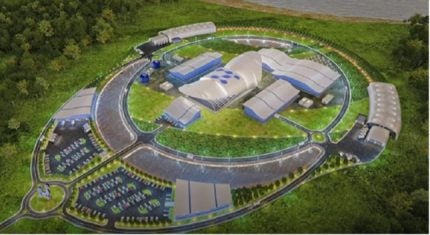
The Board of Directors at the US Export-Import (Exim) Bank has approved a final commitment for a $98m loan for pre-project services needed to develop a first-of-kind NuScale small modular reactor (SMR) in Romania. This followed a Letter of Intent (LOI) signed by Exim Bank in May 2023.
The loan is intended for the RoPower Nuclear SA project joint venture, controlled equally by nuclear utility Societatea Nationala Nuclearelectrica (SNN), the operator of the Cernavoda NPP, and private company Nova Power & Gas from the Cluj group E-INFRA. The project is for a 462 MWe VOYGR-6 SMR (six 77 MWe modules) planned for the site of a former coal-fired power plant in Doicești. RoPower hired NuScale (majority owned by Fluor) to draft the feasibility study for the plant.
SNN and Nuscale signed an initial memorandum of understanding (MOU) to investigate possible SMR deployment in 2019 followed by a teaming agreement in 2021 to deploy a NuScale VOYGR-6 power plant in Romania by 2030. A further MOU was signed in 2023 to begin conducting engineering studies, technical reviews, and licensing and permitting activities for the project. Phase 1 of a Front-End Engineering & Design (FEED) study was completed in late 2023, which analysed the preferred site of the first VOYGR-6.
A FEED Phase 2 contract was signed with Fluor Corporation in July under which Fluor will provide RoPower Nuclear with the design and engineering services required for implementation of the project, resulting in an updated cost estimate and schedule as well as the safety and security analyses needed for a final investment decision.
Exim Bank funding is considered essential for advancing the project, supporting critical activities such as site characterisation, obtaining regulatory approvals and carrying out detailed engineering work, RoPower Nuclear said. The commitment is part of an initial financing package worth $275m, which included expressions of interest from public and private partners from Japan, South Korea and the UAE and significant contributions from other international institutions, such as the US Financial Corporation for International Development (DFC) and private partners. In addition DFC and Exim Bank also issued Letters of Interest for possible support for project deployment of up to $1bn and $3bn, respectively.
In August, South Korea’s DSPE Beta Private Equity Fund, managed by DS Private Equity and a minority shareholder of NuScale, received preliminary national security clearance from the Romanian state to take over 33.33% of the shares of RoPower Nuclear. In July DSPE had signed a preliminary agreement with SNN and Nova Power & Gas based on which it agreed to invest €75m ($83m) to finance Phal;e 2 of the FEED study.
″The funding approved by US Eximbank is a confirmation of the US commitment to this large-scale project, which positions Romania as one of the leaders of new nuclear technologies,” said Energy Minister Sebastian Burduja. “I am convinced that at the end of the decade we can be among the first countries in the world with an SMR, which will mean a historic opportunity to develop a local supply chain, and Nuclearelectrica has every chance to operate other such projects throughout the region.”
RoPower Nuclear says that the project, which will begin construction after FEED Phase 2, will help Romania reduce carbon emissions by about 4m tonnes annually. “This financial commitment from Exim Bank represents a vote of confidence not only in Romania’s ability to implement state-of-the-art nuclear technologies, but also in the solid partnership between our country and the United States,” said SNN CEO, Cosmin Ghiță. “The financing will allow us to take decisive steps towards a safer, cleaner and more sustainable energy future, and Romania is thus positioned as a leader in energy innovation at the regional level.”
The Ministry of Energy has estimated that the Doicești project will need a budget of €4.9bn. In November 2023, NuScale cancelled a similar 462 MWe project in the US. The Carbon Free Power Project (CFPP) in Idaho would have been the first of its kind in the world in the company. This came after the estimated investment costs for the CFPP were increased by more than 75%, from $5.3bn to $9.3bn.






